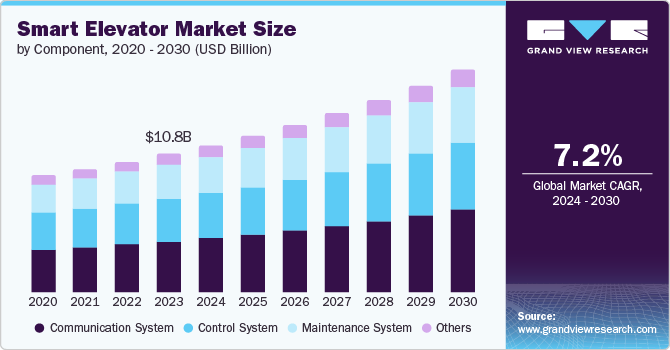Smart Elevator Market Overview
In 2023, the global smart elevator market was valued at USD 10.8 billion, and it is forecasted to reach USD 17.34 billion by 2030, growing at a compound annual growth rate (CAGR) of 7.2% from 2024 to 2030. One of the primary drivers for this shift from conventional to smart elevators is the increasing awareness around energy efficiency.
The adoption of gearless permanent magnet synchronous (PMS) traction machines is on the rise due to their efficiency, which is nearly 50% better compared to geared machines. Additionally, smart elevators often incorporate regenerative drive systems that not only significantly cut down on energy consumption but can also produce energy that feeds back into the building's power grid.

Market growth is fueled by several factors, including the rising demand for automation, energy efficiency, and advanced safety systems. Integration of technologies like the Internet of Things (IoT) and artificial intelligence (AI) has enhanced automation, improved operational efficiency, shortened wait times, and optimized performance during peak usage hours. The growing push for sustainable building practices is also accelerating the transition toward smart, energy-efficient elevator systems capable of reducing energy usage by up to 50%.
Order a free sample PDF of the Smart Elevator Market Intelligence Study, published by Grand View Research.
Key Market Trends & Insights
- Asia Pacific held the largest share of the global smart elevator market in 2023, accounting for 43.3% of total revenue. This dominance is attributed to rapid urbanization, increasing population, and large-scale infrastructure development in countries like China, India, and Japan. These factors have led to increased demand for high-rise buildings and consequently, smart elevator systems.
- In terms of components, communication systems led the market in 2023 with a 36.7% revenue share. The implementation of IoT has significantly improved real-time monitoring, data acquisition, and predictive maintenance, all of which enhance elevator reliability and safety. These systems also play a vital role in threat detection and emergency response.
- By application, the commercial sector dominated the market, representing 47.2% of revenue in 2023. This segment includes office buildings, malls, hotels, and other large properties. Smart elevators in these environments utilize features such as destination control systems, occupancy sensors, and energy-efficient components to optimize traffic flow and support sustainability goals, providing both operational efficiency and cost savings.
Market Size & Forecast
- 2023 Market Size: USD 10.8 Billion
- 2030 Projected Market Size: USD 17.34 Billion
- CAGR (2024-2030): 7.2%
- Largest Regional Market: Asia Pacific (43.3% share in 2023)
Key Companies & Market Share Insights
Key companies are leveraging IoT and AI technologies to enhance elevator performance and user experience. Through continuous innovation, strategic partnerships, and expansion of service offerings, they are driving advancements across the industry. New entrants are also contributing by offering specialized, innovative solutions that add to market competitiveness.
Notable company profiles:
- Robert Bosch GmbH is known for its strong innovation focus and operates across mobility, industrial technology, consumer goods, and energy and building technology sectors.
- PHINIA Inc. brings over a century of manufacturing experience, offering premium fuel system solutions and focusing on carbon neutrality through alternative fuel technologies.
Key Players
- Bosch Security Systems, LLC.
- FUJITEC CO., LTD.
- Hitachi, Ltd.
- HYUNDAIELEVATOR CO.,LTD.
- KONE Corporation Finland
- Mitsubishi Electric Corporation
- Otis Worldwide Corporation
- Schneider Electric
- TK Elevator
- Schindler
- Toshiba Elevator and Building Systems Corporation
- Honeywell International Inc.
- Siemens
Explore Horizon Databook – The world's most expansive market intelligence platform developed by Grand View Research.
Conclusion
The global smart elevator market is undergoing significant transformation, driven by the growing need for energy efficiency, automation, and improved safety in modern infrastructure. With a projected market value of USD 17.34 billion by 2030, the industry is set to benefit from advancements in IoT and AI technologies, along with increasing investments in sustainable construction. Asia Pacific is expected to continue leading the market, supported by rapid urban development and population growth. The evolution of elevator technology will remain a key component in shaping the future of smart buildings and sustainable urban mobility.





